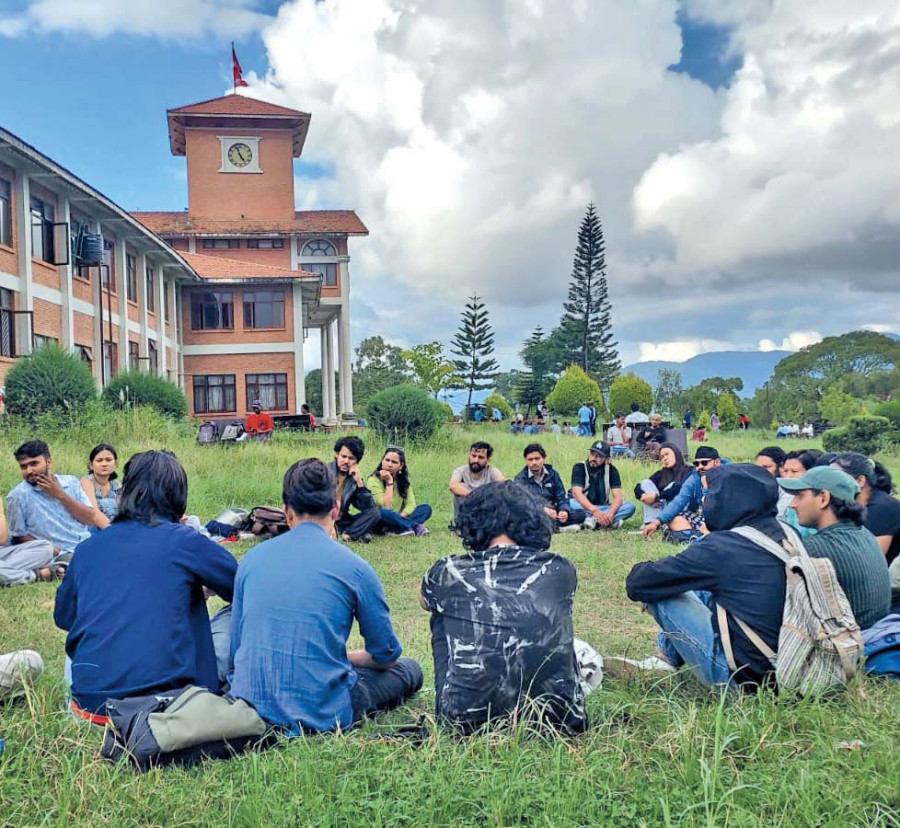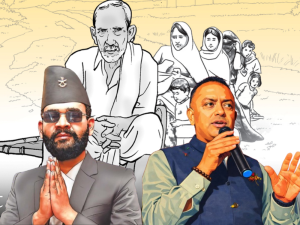Columns
Poetics of generations
Poetry of the Millennials and Gen Z is a subject of great interest today.
Abhi Subedi
The spirit associated with the generational change can be understood through poetic consciousness and the practice of presentation through reading and writing. The subject of poetry in the Gen Z uprising in Nepal is a topic that the youths I have talked to suggested to me. As a teacher, writer and interpreter of poetry, I had to make some observations on this subject. I focus on the subject of awakening, interpretation and misinterpretation of the poetics of the uprising and the waves of change. The question is not restricted to poetry writing but also encompasses the spirit that inspires people to engage in a karma that is creative and productive.
Youths have composed poetry about change through all phases of world history. As a student and teacher of poetry of both Nepali and the Anglophone world that includes French, German and Spanish poetry in English translation, I am reminded of the poets of the young generation. Their poetry embodies vision and the promise of the future. Poetry captures the spirit of the generation and the wisdom of the times. A Spanish youth named Federico Garcia Lorca had to lose his life for writing powerful poetry. The English romantic poets of the 18th and 19th centuries, like Wordsworth, Blake and Shelley, were in their youth when they wrote powerful poetry of the times. Among them, Shelley debunked the established societal values in his famous poem The Masque of Anarchy.
“When poetry ruled the streets” had become the mantra of the French student and youth uprising of May 1968. Poetic graffiti enamoured the walls of Paris. “It is forbidden to forbid” was a famous poetic refrain. The youths felt that the best way to imbibe energy is to project the spirit through poetry. Poetry could help the youths express radicalism through surrealistic poetic imagery. The use of metaphor and symbolism was the principal method of writing poetry. Rejection of authority and call for a condition to the fulfilment of desire dominated the main energy. Similarly, poetry dominated the protest chants by youths during the Arab Spring.
Poetry of the Millennials and Gen Z is a subject of great interest today among readers and people with academic interests. Literary scholars and philosophers have discussed the two aspects of poetry: Solitude and sociality. And, as the English poet WH Auden, writing on the death of the Anglo-Irish poet WB Yeats in 1939, put famously, “For poetry makes nothing happen: It survives/ In the valley of its making where executives/Would never want to tamper”, poetry is conventionally placed outside the world of activism and change.
Young Nepali poets wrote poems about change even during the autocratic rule in the country and the transitional modes of history. The poems about the time of change are remarkable. Poet Siddhicharan Shrestha wrote about revolution in his native tongue, Newari. He wrote there could be no peace without revolution (kranti bina … makhu shanti). Returning after attending a writer’s conference abroad, Shrestha wrote, the time to live secluded lives separated by mountains and dales is over now giri gawharale bhinna bhai aba.
Another youth named Kedarman Vyathit wrote a poem, the gist of which is—all night long I heard the sound of the storm uprooting the trees and producing sounds of cracking and falling, and then in the calm of the morning I rose to see the revolution happen in the country (desma inquilab bhaeko). Laxmi Prasad Devkota, after returning from a literary meeting outside Nepal, wrote, “We Nepalis are the children of the dawn (hami ushasuta Nayapali)”. This is a poetic picture of how Nepali youths in the past expressed their time in poetry. In later times, youths heralded the new change through poetry.
The voice of generations is especially a great phenomenon in poetry. The youths of earlier times present examples of how poetic imaginaire and current problems coalesce productively. Young poets of all generations in Nepal and outside have chosen poetry as the eloquent medium of writing. I do not have space here to write about the poetic modes of change with each generation. Poets of the millennial generation and later the Gen Z generation, which is a familiar word in Nepal now, have become important names in different countries.
In Nepal, young poets have not come out reciting the poetry of change in many cases, but they have projected the spirit through excellent poetry. Youths who have not introduced themselves as Gen Z have written excellent poems. I was moved by the power of the poetry of youths during the Tikapur Literary Festival held on March 8-10, 2025. The presence of youths was impressive. They instilled a new life into the festival.
Among them was Rakshya Bam, who is presently at the forefront of the Gen Z movement. One could easily feel the energy of the youths on that occasion. In an article titled Literary festivals: Quest for energy I wrote, “I was drawn by a desire to witness how the revival of energy in Tikapur brought together hopes, dreams and personal experiences. Literature is an apt metaphor for that.” (The Kathmandu Post, March 16, 2025). It is one example of such youth-dominated creative festivals.
To conclude, as said above, on ‘the subject of awakening and the interpretation and misinterpretation of the subject of the poetics of the uprising and the waves of change’, I want to stress one point of importance: It is a subject of consonance of the poetic spirit with the actions and drawings of the plans of actions. Now in Nepal, people who are in the role of drawing out such plans of action by keeping the creative spirit are facing challenges in addressing the creative spirit of the rebellion of the youths. Such tremendous moments have occurred in history in different countries.
Transforming the creative spirit into action has always been a subject of gain and challenge. We are precisely experiencing that. I read that people in governments and on political fronts seeking to capture the spirit of the moment are facing challenges to transform that into action for drawing plans for the future. This is a poetic moment. Theories, ideologies and interpretations are always there; they are vital to forge ahead. But we should primarily understand the poetics of the moment—the Gen Z spirit of change experienced here.




 10.95°C Kathmandu
10.95°C Kathmandu

.jpg&w=200&height=120)













